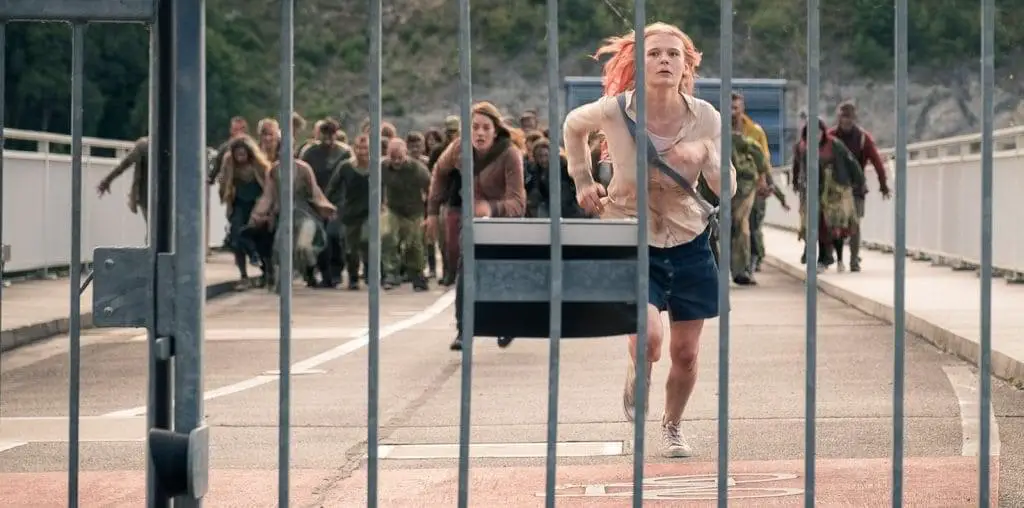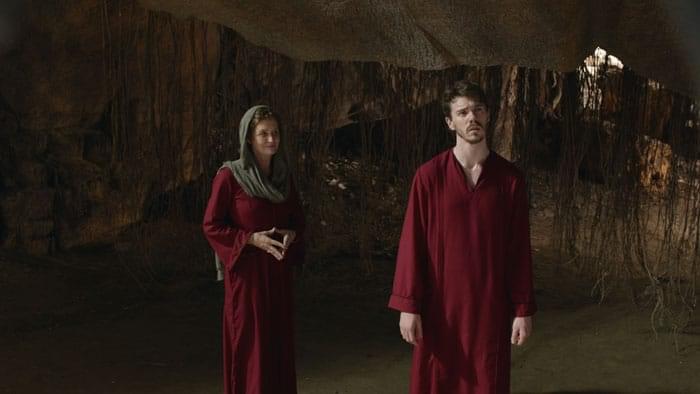
In the dark confines of a video poker bar where the only noticeable light comes from the machines in the bar, a different kind of lifestyle emerges, where each moment hinges on the ability to score big by way of elusive cards. Everyone here is after money, each of them has a certain goal that they carry with them, and want to unload it quickly. Paul (Colm Byrne) wants money to put toward his car, and is not happy at the barkeep, Kieran (Kendall Pigg), being a little too friendly toward his girl, Reagan (Rhonda Keyser). This isn’t any ‘50s rumble, though and Kieran isn’t one of those pathetic men out to score. He has been at this bar for a long time. Perhaps too long. He’s likely seen different variations of what’s going on at the moments in this bar, all happening in 91 minutes. In fact, that’s one of the distinctions of “Losing Ground”, keeping close time like that and plunging all its characters in a setting of desperation that doesn’t end with anyone crying like their life is going to end and then suddenly breaking into a monologue about how they weren’t loved as a kid or how they lost everything when their family left them for better pastures that were cleaner than what they had. It’s simply life as Bryan Wizemann sees it.
First, he saw it as a play and “Losing Ground” was produced as one, performed too. This film version is probably close to how it was on the stage. All the actors from the original production reprised their roles for this; wise choices all around since only they could possess the glances, the worn faces, the sighs, and the frightened dealings that are these people. Michelle (Eileen O’Connell) is the one armed with the most important theme of Losing Ground. Walking in, looking like one of those flashy trashy rich girls on TV, but far from that, she just wants to see four aces on her screen. She feels like tonight’s the night. Like the others, she knows what that kind of luck feels like. But oh what she has to do to get it. This group is the last kind you’d ever want to meet, but there hasn’t been such a heartbreaking ending like this in a very long time. To what lengths do we go to get our four aces? We live every single day, working, breathing, screwing, eating, watching, and doing so much more that we think will get us further toward where we want to go. But how far can we each go? What it takes for Michelle to get to where she wants represents us just as much. Sometimes, it’s a shocking sacrifice. But we’re only too human, as this movie proves.
The other denizens of this bar are varied. Marty (Monique Vukovic) plays the machine so she can win money to send to her son who’s at Arizona State University, working on becoming a veterinarian. It’s only later that we learn why she wants to help her son so badly. And through her, the misfortunes of life spill through. Paul’s desire to win is superficial, but his anger at Turner (John Good) is palpable. For the man with the cowboy hat sits at the exact machine that Paul occupied the previous evening, working on it for hours, trying to get a lucky hand and meanwhile, Turner comes up with gold through two hands in less time. Some people are lucky and some just slog through, terribly unlucky and without a glimmer of promise. It’s wrenching to watch these characters, especially in that one moment that breaks Michelle when she’s in the bathroom with Turner, trying to make a deal that will get her more money. It’s not that kind of deal on her end, but Turner makes it exactly that kind and as he moves in closer to her each time, his frame blocks the camera, symbolizing how far gone she now is. She’s just an empty soul.
And it’s not just by these characters in which “Losing Ground” derives its power. Mark Schwartzbard’s cinematography knocks out daylight completely or any kind of light that means hope for any of these people. The bottles behind the bar are just as dark as their faces. And even though the drinks are no charge if they play the machines, it doesn’t help the pain that we see. Even with lit cigarettes and consumed drinks, it doesn’t do anything for them. It is what it is. Wizemann doesn’t try to Mametize anything, having dialogue come out of these characters’ mouths that sounds so foreign from their standing in life. When they do speak, it’s as we expect, just enough to call for another drink or deal with a looming situation, mainly that of losing money. We all lose a lot in life. These characters lose too. And with that, “Losing Ground” makes its greatest connection in knowing us just as much as we know these characters. It is fascinating filmmaking that gets to the core of humanity, scrapes out even the most bottommost parts of it, and holds it up to examine it. And with that, the commonalities between the person drinking at the bar all day and the person working diligently at the office become clearer.

